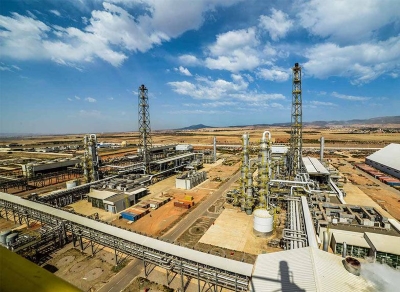To start commercialization by 2023/24 of ammonia and methanol as the shipping fuels of the future.

OCI N.V. enters into agreements with MAN Energy Solutions, Hartmann Group and Eastern Pacific Shipping to create marine value chain and start commercialization by 2023/24 of ammonia and methanol as the shipping fuels of the future.
Brian Østergaard Sørensen, Vice President and Head of R&D, Two-Stroke Business at MAN Energy Solutions, said: “We view these initiatives as closely aligned with our own strategy of cooperating with external partners to develop sustainable technologies. Methanol and ammonia are very interesting candidates as zero-carbon fuels. In fact, we have already introduced a methanol-burning two-stroke engine, while we expect to deliver the first ammonia-fueled engine in 2024. MAN Energy Solutions is fully committed to the maritime energy transition and the development of technology that exploits alternative, clean fuels.”
Jens Seeberg, Head of Retrofit & Upgrade at MAN PrimeServ Denmark, said: “For us, the path to decarbonizing the maritime industry starts with fuel decarbonization. Happily, the flexibility of the ME-C engine enables us to retrofit the existing fleet into methanol-fueled vessels that have a significantly reduced environmental impact. We look forward to moving with our industry partners towards these sustainable goals.”
Shipping currently accounts for almost 3% of global CO2 emissions, but is one of the hardest sectors to decarbonize due to the cost effectiveness of heavy fuel oil and dispersed refueling. The International Maritime Organization (IMO) has set emissions targets for 2030 and 2050 that can only be achieved through the adoption of low-carbon fuels on new and existing vessels.
Ammonia and methanol, OCI’s core products, are the only practical alternatives for long-distance shipping. With global infrastructure in place, these products can bridge the transition from “grey” to “green” until the industry has fully scaled up to products based solely on renewable energy sources.
In addition to newly built ships, it will be essential to convert engines from conventional fuel to methanol and ammonia to meet these targets. These two partnerships focus on the full spectrum of retrofits and new-builds to ensure that as many vessels as possible can reach compliance on time.
Compared to hydrogen and LNG, ammonia is widely used and easier to store with extensive global distribution and storage infrastructure in place. Methanol is a liquid and is interchangeable with most refined products in tanks and pipelines, making its adoption seamless with existing bunkering infrastructure.
The emergence of ammonia and methanol as the most logical alternative to conventional fuels presents a large opportunity for OCI. The company has therefore made it a top priority to make these established low carbon fuels for shipping and is accelerating the transition to produce additional blue and green ammonia and methanol at its plants.
Capt. Alfred Hartmann, Chairman of the Supervisory Board of the Hartmann Group and President of German Shipowners’ Association, said, “Hartmann Gas Carriers Germany together with their commercial arm, GasChem Services in Hamburg, are convinced of the opportunities that ammonia-fueled vessels will offer to the environment. At a time when the maritime industry is at the dawn of a new era and looks for options to decarbonize shipping, we are proud and excited to be part of this highly innovative, future-looking project. The new vessel type will enable us to reduce carbon emissions significantly and set new standards for environmentally-friendly shipping.”
Subscribe to our newsletter & stay updated.